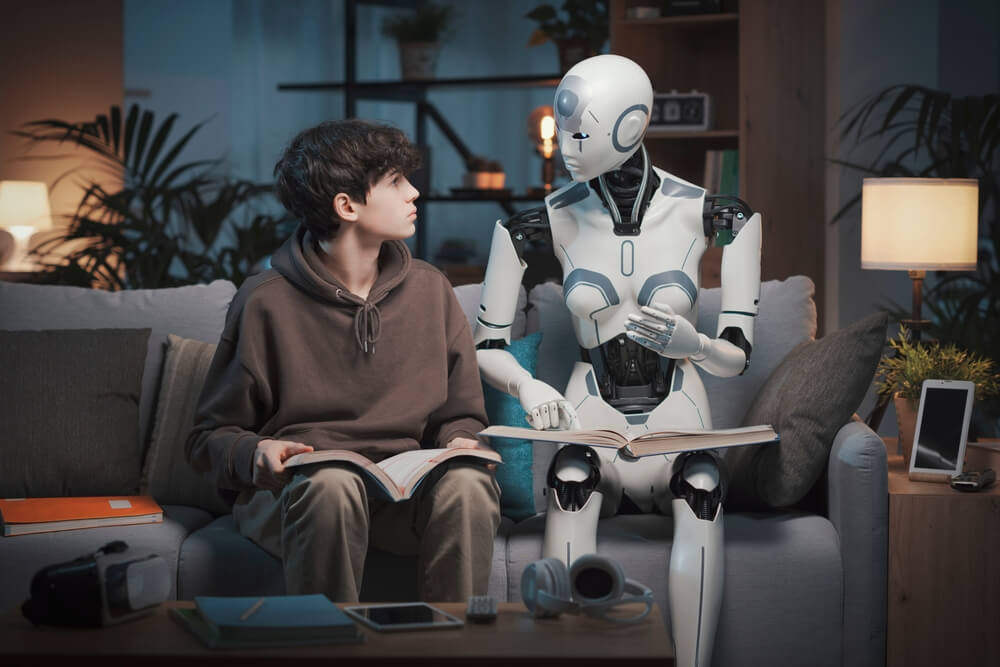
Future of Artificial Intelligence
Artificial Intelligence (AI) has become a powerful force in the digital world, changing how we live and work and revolutionizing many businesses. AI will be even more critical in the future as technology keeps improving. This piece talks about the exciting possibilities and possible problems of artificial intelligence in the future. AI, “artificial intelligence,” is a branch of computer science that tries to make intelligent tools that can think like humans. Thanks to improvements in machine learning, natural language processing, and robots, AI has gone from being an idea to a real thing over time. AI has a bright future that will change many industries and shape the digital world.
The Rise of Artificial Intelligence
In recent years, AI companies have given artificial intelligence lessons to help more people understand it easier. AI has made a lot of progress. The creation of powerful hardware, the availability of massive datasets, and advances in algorithms have sped up the growth of AI technology. A branch of AI called “machine learning” has become very important for letting computers learn from data and improve over time. AI affects technology because of how it affects computing. AI enables computers to take advantage of vast amounts of data and use their learned intelligence to make the best choices and find new things in a fraction of the time it would take a person.
How Can I Use Artificial Intelligence in Digital World?
AI is used in many different fields, which is changing how companies work and how they interact with their customers. AI is the brains behind many products and services in the digital world. Some well-known uses are:
1. AI and Automation
AI has the ability to automate tasks that are done over and over again, streamline processes, and make things run more smoothly. Businesses can automate customer service, data analysis, and making decisions with the help of robotic process automation (RPA) and machine learning techniques.
2. Enhancing User Experience with AI
AI lets users have experiences that are unique and engaging. AI is used by chatbots, virtual assistants, and recommendation systems to provide customized services, improve customer happiness, and make digital platforms more attractive.
3. AI in Healthcare
AI has a lot of potential in the healthcare field. It can help doctors diagnose diseases, look at medical pictures, and guess how a patient will do. AI-powered systems can help doctors and nurses make more accurate and quick decisions, which can lead to better patient care.
4. AI in Finance
AI is changing a lot of things in the financial industry, like how fraud is found, how risks are evaluated, and how algorithmic trade works. Chatbots that AI drives are also being used to help customers and give personalized financial advice.
Ethical Things to Think About and Problems
As AI becomes more common, it brings up social questions and problems. Some of the most important things that need to be fixed are worries about privacy, bias in AI systems, job loss, and the possibility that AI will be more intelligent than humans. The future of AI needs to find a balance between its benefits and the protection of human ideals.
The Future of AI and Human Partnership
AI isn’t expected to replace humans but to improve their skills and make working together easier. Partnerships between people and AI could help solve complex problems, boost creativity, and speed up creation. Using the strengths of both people and machines, future workers will be able to use AI to do amazing things.
AI’s Impact on Job Market
Concerns about job loss have been made by the widespread use of AI. AI may automate some jobs, but it also opens up new ways to get a job. As AI technology improves, it’s important for people and businesses to change and learn new skills so they can take advantage of the possibilities it brings.
AI and Cybersecurity
With cyber dangers getting more complicated, AI can be a very important part of improving security. AI-powered systems can find problems, find possible threats, and react to cyber attacks in real time. AI can protect private information and make digital defenses stronger by looking at huge amounts of data and patterns.
AI in Education
AI can be very helpful in the area of education. Some of the ways AI can improve education are through personalized learning, intelligent teaching systems, and adaptive tests. AI can enhance learning outcomes and make education available to everyone by adapting educational material to each person’s needs.
AI and Personalization
AI lets businesses give customers more unique experiences. AI algorithms can suggest relevant products, services, and content by looking at user data and how they act. AI-powered personalization makes customers more interested, boosts sales rates, and makes customers more loyal.
The Limitations of AI
AI has made much progress, but it still can’t do everything. That’s why human intervention is a must when using AI tools. It is also essential to take free AI courses to help you understand more about artificial intelligence. AI systems depend on the amount and quality of data they access. Also, issues like ethics, the ability to understand AI choices, and the possibility of bias need to be dealt with to ensure that AI is used fairly and responsibly.
Conclusion
In the digital world, the future of artificial intelligence is full of promise and chance. AI will continue to change businesses, improve how people use them, and drive new ideas. But it’s essential to deal with the social problems that come with AI and ensure that humans and AI work together to get the most out of it.





